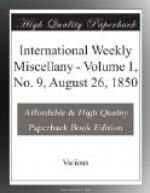“Eh?” cried Mr. Bagges. “Upon my word! One of these day, we shall have you setting the Thames on fire.”
“Nothing more easy,” said Harry, “than to burn part of the Thames, or of any other water; I mean the gas that I have just told you about, which is called hydrogen. In burning, hydrogen produces water again, like the flame of a candle. Indeed, hydrogen is that part of the water formed by a candle burning, that comes from the wax. All things that have hydrogen in them produce water in burning, and the more there is in them the more they produce. When pure hydrogen burns, nothing comes from it but water, no smoke or soot at all. If you were to burn one ounce of it, the water you would get would be just nine ounces. There are many ways of making hydrogen besides out of steam by the hot gun-barrel. I could show it you in a moment by pouring a little sulphuric acid mixed with water into a bottle upon a few zinc or steel filings, and putting a cork in the bottle with a little pipe through it, and setting fire to the gas that would come from the mouth of the pipe. We should find the flame very hot, but having scarcely any brightness. I should like you to see the curious qualities of hydrogen, particularly how light it is, so as to carry things up in the air; and I wish I had a small balloon to fill with it, and make go up to the ceiling, or a bag-pipe full of it to blow soap-bubbles with, and show how much faster they rise than common ones, blown with the breath.”
“So do I,” interposed Master Tom.
“And so,” resumed Harry, “hydrogen, you know, uncle, is part of water, and just one-ninth part.”
“As hydrogen is to water, so is a tailor to an ordinary individual, eh?” Mr. Bagges remarked.
“Well, now then, uncle, if hydrogen is the tailor’s part of the water, what are the other eight parts? The iron turnings used to make hydrogen in the gun-barrel, and rusted, take just those eight parts from the water in the shape of steam, and are so much the heavier. Burn iron turnings in the air, and they make the same rust, and gain just the same in weight. So the other eight parts must be found in the air for one thing, and in the rusted iron turnings for another, and they must also be in the water; and now the question is, how to get at them?”
“Out of the water? Fish for them, I should say,” suggested Mr. Bagges.




